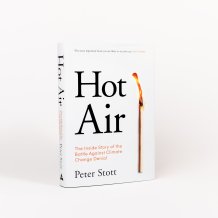
Hot Air by Professor Peter Stott, of the University of Exeter and the Met Office
Exeter scientist's book shortlisted for Royal Society prize
A book about climate change science and denial has been shortlisted for the Royal Society Science Book Prize.
Hot Air – by Professor Peter Stott, of the University of Exeter and the Met Office – is one of six titles up for the award, which celebrates the best popular science writing from across the globe.
In the book, Professor Stott tells the inside story of the battle against climate change denial, as seen from more than 25 years as a climate scientist.
He describes how scientists saw increasing evidence of the "fingerprints of humans" as a cause of climate change – and how so-called "climate sceptics" have "weaponised doubt in the service of the fossil fuel industry".
Professor Stott said: "I'm thrilled that Hot Air has been shortlisted for the Royal Society Science Book Prize.
"I wrote my book because I think it is an important – and gripping – story that needs to be widely known, so I'm very grateful for this prestigious recognition.
"I have had the immense good fortune to carry out my scientific research into the vital global issue of climate change at the Met Office and the University of Exeter, out of which experiences my book has come."
Professor Maria Fitzgerald, chair of the 2022 judges, said: "The process of shortlisting the Royal Society Book Prize was a delight.
"It confirmed the high standard of contemporary science writing and the continued originality and talent of writers who can convey the excitement and impact of advances in science to the public.
"All six books are excellent reads and the panel is confident that they represent the very best of science writing today."
Brian Cox, Royal Society Professor for Public Engagement in Science, added: "Good science writing ensures that you will never see your world in the same way again.
"It places science at the heart of our culture, illustrating why discoveries that may seem esoteric at first sight can change our lives in myriad ways.
"Whether it be stories of the development of new cutting edge technologies or the exploration of the deepest of mysteries, science books should form a core part of any curious reader’s literary diet."
Rory Cellan-Jones – former BBC journalist and one of the judges – called Professor Stott's book: "A compelling and incisive account of the long battle against climate change denial, made all the more urgent in the context of continuing attacks on climate science and well-funded global resistance to taking the action required to tackle the dangers of climate change.
"Stott offers a fascinating insider look into the meticulous workings of the Intergovernmental Panel on Climate Change (IPCC) as they tackle one of the biggest challenges facing humanity today.
"A truly gripping and alarming read – quite simply, I couldn’t put it down."
The full shortlist for the prize, sponsored by Insight Investment, is:
- The Greywacke: How a Priest, a Soldier and a School Teacher Uncovered 300 Million Years of History by Nick Davidson.
- Different: What Apes Can Teach Us About Gender by Frans de Waal.
- Spike: The Virus vs. The People - the Inside Story by Jeremy Farrar with Anjana Ahuja.
- A (Very) Short History of Life on Earth: 4.6 Billion Years in 12 Pithy Chapters by Dr Henry Gee.
- Age Proof: The New Science of Living a Longer and Healthier Life by Professor Rose Anne Kenny.
- Hot Air: The Inside Story of the Battle Against Climate Change Denial by Professor Peter Stott.
Date: 27 September 2022
